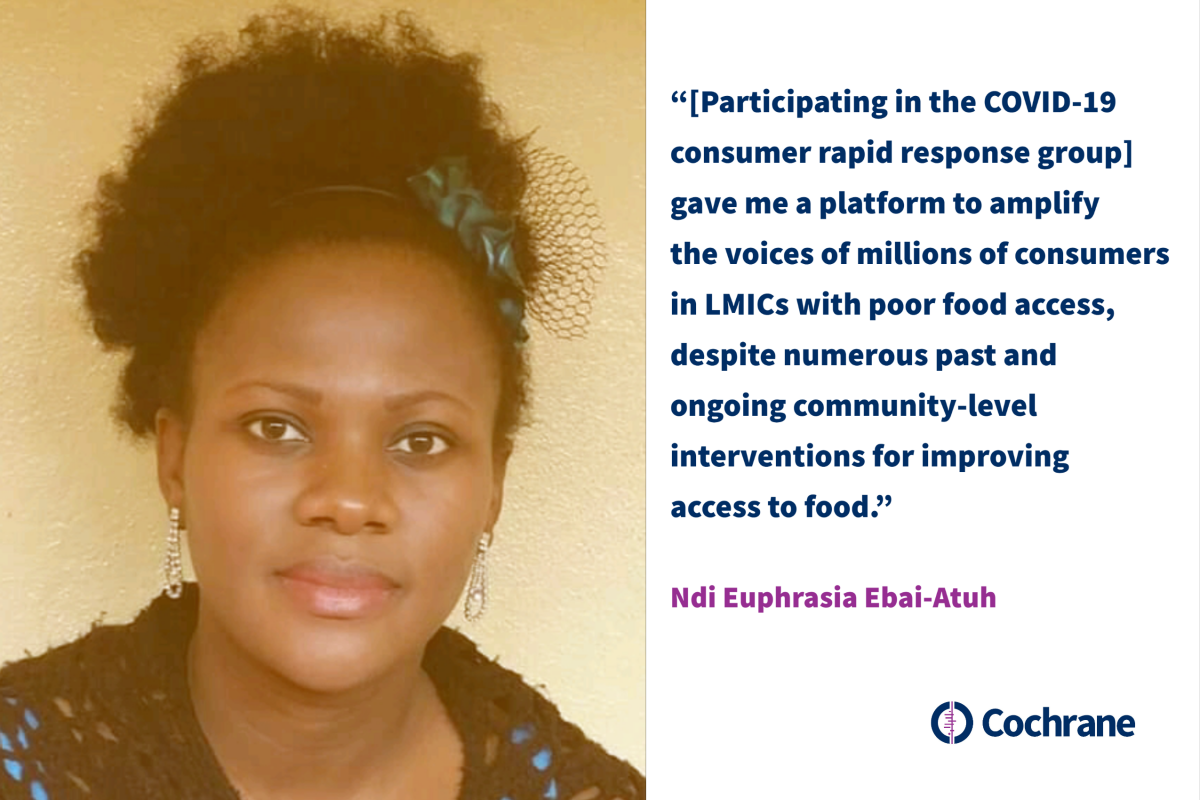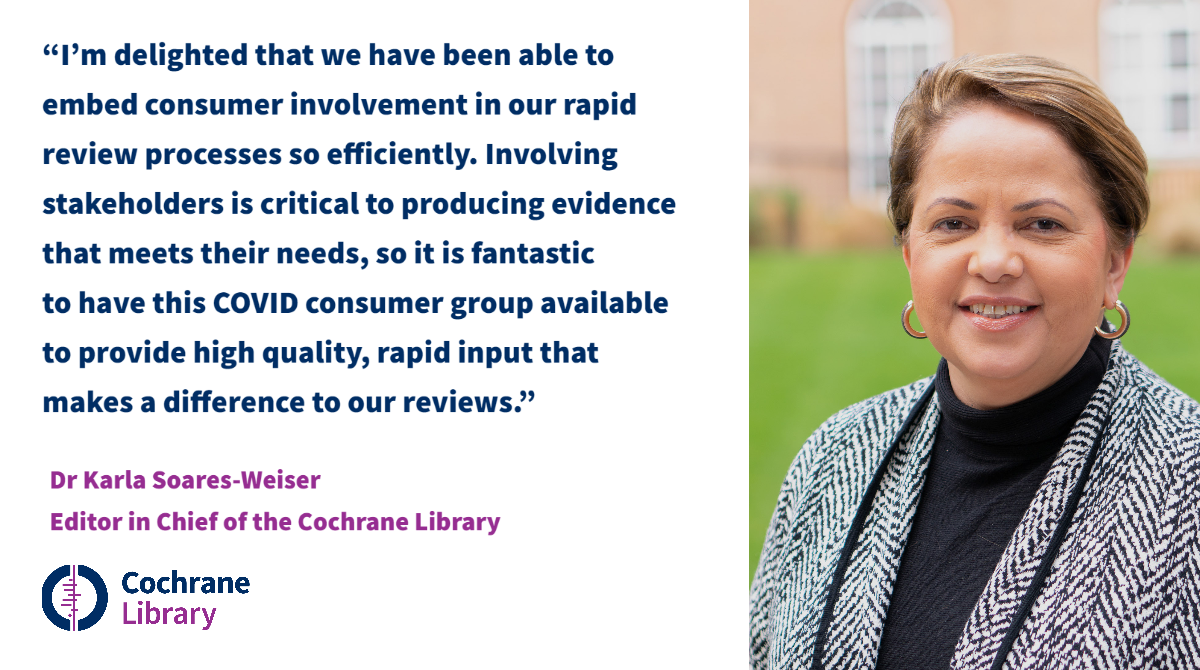
In April 2020, Cochrane launched the COVID-19 consumer rapid response group. Currently, more than 100 people with lived experience related to COVID-19 have joined the group, signing up to offer their time, skills, and experience to get involved with Cochrane’s work on COVID-19 rapid reviews and accommodate limited timelines. Thus far, 18 consumers have been connected with research teams for 18 COVID-19 rapid reviews, either as members of author teams or as peer reviewers, and consumers are being connected with partner organizations, as well.
As the full implications of the Coronavirus (COVID-19) pandemic became clear earlier in 2020, Cochrane made synthesizing relevant evidence for prevention and treatment its number one priority. Cochrane authors, editors, consumers, and other collaborators were motivated to do COVID-19 research, and Cochrane quickly mobilised its global community to undertake a series of rapid reviews, among other COVID-19 response work. The involvement of healthcare consumers (patients, carers, and the public) is a Cochrane policy and is part of guidance for the production of rapid reviews. With COVID-19, however, it quickly became clear that Cochrane needed to facilitate collaboration between review teams, editorial staff, and consumers in the short time available for completing a rapid review.
Long-time Cochrane collaborator and patient and caregiver involvement researcher, Lyubov Lytvyn (@lyubovlytvyn), was interested in how Cochrane could use its platform. “I lead the patient and caregiver partnership initiative for the MAGIC/BMJ Rapid Recommendations (international clinical practice guidelines with linked systematic reviews, infographics, and decision aids), and am doing my PhD on this topic. When I saw Cochrane’s rapid reviews, I reached out to ask how they were involving consumers, to inform my own work. It turned out that, while it was part of their guidance, there wasn’t an easy process to help connect consumers and review teams in a short time frame.”
To address this, a task group was quickly formed, made up of consumers, researchers, and others who have led Cochrane’s consumer-involvement work. It swung into action, quickly identifying the ways in which tools and resources could be developed to help consumers and researchers partner together. Drawing on previous work - including Involving People (learning resource for systematic review authors), and Evidence Essentials (free online resource offering an introduction to health evidence and how to use it to make informed health choices) - the group put together a web page of resources, including:
- Learning for people who wanted to get involved;
- Support for volunteers, including a group of experienced consumers who could offer peer support;
- A series of “how to” one-page guidance for consumers and review teams; and
- Some short videos that explained how to get involved.
While putting together these resources, recruitment of volunteers from around the world with lived experience related to COVID-19 began, and the response was impressive.

Ndi Euphrasia Ebai-atuh (@Euphras01426918) from Cameroon was the first consumer to be linked with a rapid review research team. The review looks at community-level interventions for improving access to food in low- and middle-income countries. Of the experience working with the team thus far, Euphrasia commented “I felt represented as a consumer even during ‘no time to waste’ research circumstances such as these, under the COVID-19 pandemic...It gave me a platform to amplify the voices of millions of consumers in LMICs with poor food access, despite numerous past and ongoing community-level interventions for improving access to food. I felt once more reassured of Cochrane’s commitment to consumer involvement and will call on the entire Cochrane community of researchers to take advantage of consumer involvement in research, for it can greatly improve evidence uptake!”
Jodie Doyle, Managing Editor of the Public Health Group overseeing the review added, “Not only did Euphrasia return her very useful comments to us within 7 days, upon follow-up she also provided advice on organisations and individuals to whom we should disseminate the published review.”
Vivek Podder was recruited for the protocol of the Cochrane rapid review, "Effectiveness of Contact Tracing Technologies in Epidemics", as a consumer referee for Cochrane Public Health. Jodie commented, “Vivek got his feedback to us quickly and provided really good insight from the perspective of a consumer in an LMIC. The editorial and authorship team are really grateful for his input.”
Over recent months, it has become clear that research on COVID-19 will be a priority for the foreseeable future. The voices of those with lived experience of this disease, whether as a patient, carer, or member of the public, will be important to producing relevant synthesized evidence going forward. Not all volunteers have been connected with research teams yet, and the task group is looking for new ways to involve consumers in Cochrane’s COVID-19 efforts. There are also plans to evaluate and present this innovative consumer involvement work for the wider research community.
Karla Soares-Weiser, Editor in Chief of the Cochrane Library, was enthusiastic about the process: “I’m delighted that we have been able to embed consumer involvement in our rapid review processes so efficiently. Involving stakeholders is critical to producing evidence that meets their needs, so it is fantastic to have this COVID consumer group available to provide high quality, rapid input that makes a difference to our reviews.”

Richard Morley, past Consumer Engagement Officer for Cochrane, says “In these troubling times, it’s been so heartening to see people volunteering to help get the evidence that health professionals, patients, carers and policymakers need to respond to this public health crisis. Thank you to everyone.”
- If you would like to learn more, please email consumers@cochrane.org.

